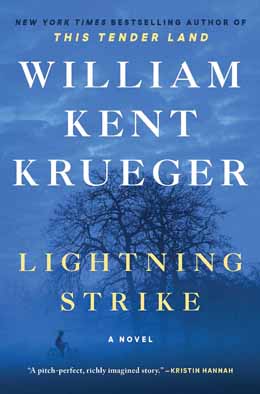When it comes to regional crime fiction, one would be hard-pressed to find a more accomplished practitioner than William Kent Krueger. In both his Cork O’Connor series and his stand-alone literary mysteries, location is a central focus and readers can always count on being transported. With his latest release, Lightning Strike, William Kent Kruger travels back to 1963 to give his loyal fans a glimpse at the origins of Cork’s sense of justice and his precarious placement in the larger society. Because it is a prequel, it is also an excellent way for new readers to discover this first-class writer’s ability to impart so much wisdom with his words while also telling a gripping crime story.
Like all the books in the Cork O’Connor series, the title of the novel comes from a very specific location. Lightning Strike is an abandoned logging camp near, Aurora Minnesota with a complex and storied history. Finding out more about this location throughout the book factors into the plot so that is best left for readers to discover on their own, however, it is not a spoiler to say that the novel opens with a young Cork stumbling upon a body hanging from a tree within Lightning Strike in what most will eventually assume was a suicide. However, Cork’s father Liam is the sheriff of Aurora, so he has grown up around investigations of crimes and various evidence leads Cork believes people are jumping to the wrong conclusion.
Since it is 1963 in rural Minnesota, Cork is given more freedom than he probably would be today. Being out of the watchful eye of adults allows he and his friends to begin their own amateur investigation into this man’s death, even while his father is also not sure about the claim of suicide and embarks on a more official inquiry into the case. These two parallel investigations will change all the parties involved. The dynamic between father and son is clearly important to William Kent Krueger and watching how that unfolds in one of the true delights of Lightning Strike.
Fans of the series know that this area of Minnesota is populated by many indigenous groups, mainly of the Anishinaabe Ojibwe peoples. Cork himself – through his mother’s lineage – is one-quarter Ojibwe, so it is no surprise that many of the novels in the series feature discussion of the racial injustices experienced by these indigenous populations and Lightning Strike is no exception. What is different is that Cork is twelve years old, so what happens during his impromptu investigation will have a lasting impression on him as he grows and eventually becomes a sheriff himself.
William Kent Krueger writes in a lyrical manner, weaving together nature and nurture in unique ways. The crime is always the backdrop for his storytelling, but the beauty within his narrative really comes from his understanding of human nature and his ability to bring the natural world to life. Readers will find themselves returning to entire paragraphs, just to luxuriate in the masterful prose of a born storyteller.
After this slight detour to Lightning Strike, it is likely William Kent Krueger will return to the series with Cork as an adult, but when readers make their next return visit with Cork, they will have a new appreciation for him and a better understanding of the impact his father had on his life. For that, we are most certainly richer in spirit.

BUY LINKS: Lightning Strike by William Kent Krueger
Disclaimer: A print galley of this title was provided to BOLO Books by the publisher. No promotion was promised and the above is an unbiased review of the novel.
